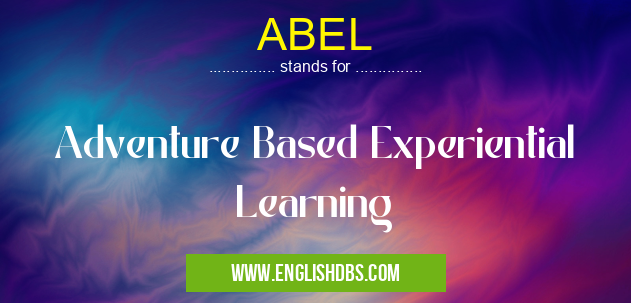What does ABEL mean in EDUCATIONAL
ABEL, an acronym for Adventure Based Experiential Learning, is an educational approach that utilizes outdoor and adventure activities to enhance learning outcomes. It emphasizes hands-on experiences, reflection, and collaboration, fostering personal growth and transformative learning.

ABEL meaning in Educational in Community
ABEL mostly used in an acronym Educational in Category Community that means Adventure Based Experiential Learning
Shorthand: ABEL,
Full Form: Adventure Based Experiential Learning
For more information of "Adventure Based Experiential Learning", see the section below.
» Community » Educational
What is ABEL?
ABEL involves engaging in challenging and physically active experiences, often in outdoor environments. These activities can include rock climbing, kayaking, ropes courses, and wilderness expeditions. Through these experiences, participants develop problem-solving skills, communication abilities, trust, and resilience.
Importance of ABEL
ABEL has gained recognition as a valuable educational tool due to its numerous benefits:
- Experiential Learning: Provides real-life experiences that foster deep understanding and retention of concepts.
- Personal Growth: Facilitates self-discovery, builds confidence, and promotes emotional regulation.
- Teamwork and Collaboration: Strengthens relationships and improves communication and cooperation skills.
- Risk Management: Teaches participants to assess and manage risks effectively, enhancing their safety awareness.
- Lifelong Learning: Inspires a passion for learning and encourages participants to seek out new challenges and experiences.
Essential Questions and Answers on Adventure Based Experiential Learning in "COMMUNITY»EDUCATIONAL"
What is Adventure Based Experiential Learning (ABEL)?
Adventure Based Experiential Learning (ABEL) is an educational approach that uses outdoor activities and challenges to promote personal growth, leadership, and teamwork skills. It emphasizes hands-on experiences, reflection, and group processing to foster learning and self-discovery.
How does ABEL help students?
ABEL provides numerous benefits for students, including:
- Enhanced self-confidence and self-esteem
- Improved communication and interpersonal skills
- Increased teamwork and collaboration abilities
- Greater risk-taking and problem-solving abilities
What types of activities are used in ABEL programs?
ABEL programs typically involve a range of outdoor activities, such as:
- Rock climbing
- Hiking
- Camping
- Canoeing
- Group games and exercises
Is ABEL only for physical activities?
No, ABEL encompasses more than just physical challenges. It also emphasizes reflection, group processing, and emotional development. Through facilitated discussions and debriefing sessions, participants explore their experiences, identify key learning points, and apply them to their personal and professional lives.
How can I find ABEL programs?
ABEL programs are offered by various organizations, including:
- Schools and universities
- Adventure education companies
- Leadership development programs
- Youth organizations
Final Words: ABEL offers a unique and effective approach to education that empowers individuals with essential life skills and fosters transformative learning. By engaging in adventure-based activities, participants gain invaluable experiences that enhance their personal growth, teamwork abilities, and problem-solving capacities. ABEL is a transformative educational approach that has the potential to shape individuals into confident, resilient, and capable individuals.
ABEL also stands for: |
|
| All stands for ABEL |
